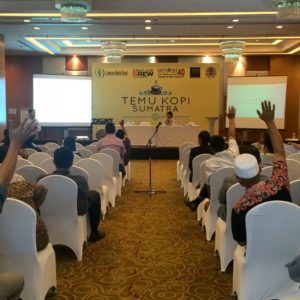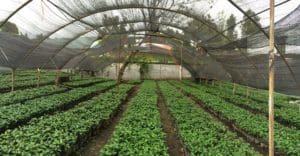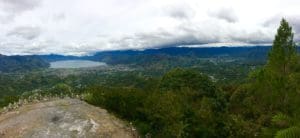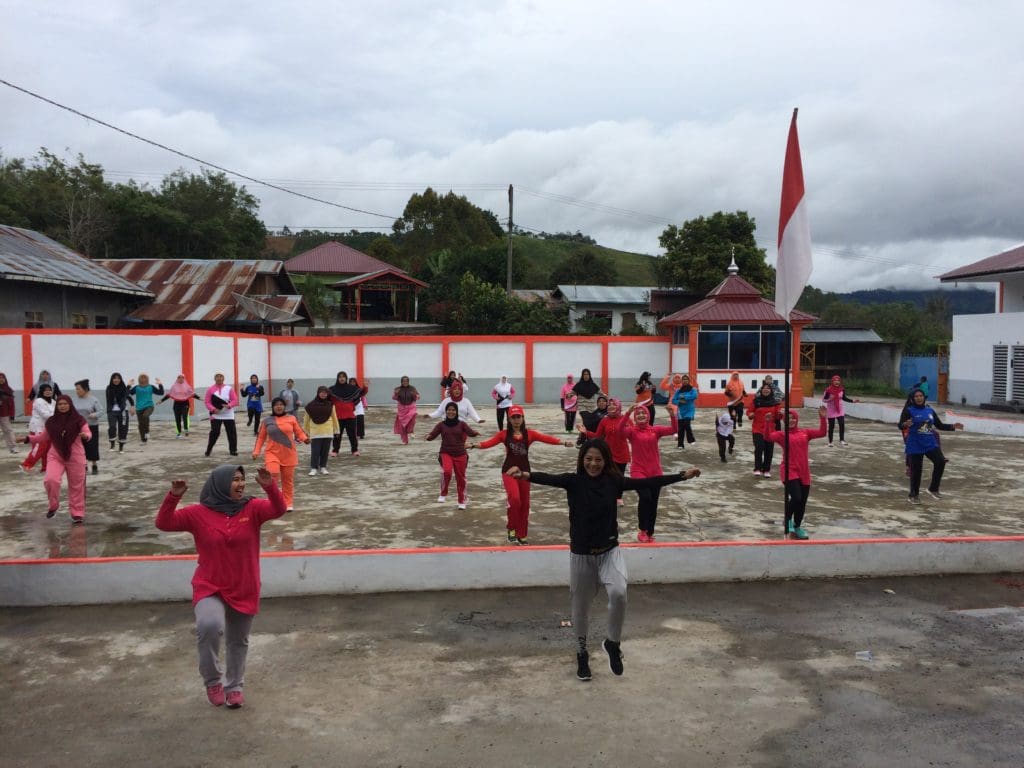We kicked off this year’s visit to Sumatra in the city of Medan at Temu Kopi, a two-day forum on Sumatran coffee production, with approximately 50attendees from across the value chain. Together, we discussed a range of issues facing the Indonesian coffee industry such as improving quality, managing risk, accessing credit and financing and ensuring environmental sustainability. Perhaps the most interesting takeaway from the event is that producers sweepingly concur that a rising earth temperature resulting in lower yields is the most significant threat to their crops. The effects are quite tangible, and farmers throughout Indonesia can see the sobering confirmation generated from lack of rain and higher temperatures. This has proven to be extremely detrimental in areas where coffee grows below 1,100 meters, and two cooperatives with whom we work very closely reported a 60% decrease in yields in coffees grown below this altitude.
Medan is home to many large exporters, as it’s the nearest city center to Sumatra’s primary port of Belawan. We had the opportunity to visit with a wide variety of exporters in the area, some of which are considered “small” (exporting around 30 containers per year,) as well as visiting the biggest exporter in Sumatra who ships out more than 300 Arabica containers annually. Many exporters are also focused on other commodities, such as spices and cocoa. After several days in Medan, we headed north to the Gayo highlands to visit cooperatives in and around Takengon, located in the Aceh province. The vast majority of people living in this area belong to the ethic group known as the Gayo (or Gayonese) people. An interesting (and previously unknown fact for me personally) is that surnames are not regarded with any great importance, Many Gayonese-born individuals do not have a last name at all. They are legally identified by only one name, their “first” name. In this region, we work very closely with two cooperative groups: Permata Gayo Cooperative and Ketiara Cooperative.
We began with a visit to Koperasi Permata Gayo, which is located in Bener Meriah district. We began our relationship with this cooperative in 2009, and the following year our own Chris Davidson hosted a cupping training for cooperative board members. In 2012, Atlas Coffee along with Keurig Green Mountain funded and built a cupping facility. Permata Gayo believes strongly in equality for its members and they have identified three keys for a successful cooperative: transparency, democracy and accountability. We spent the greater part of the morning learning how the cooperative functions, about the role of the board members, the election processes and their plans for growth. Armia, who is a both a member of the cooperative and also the managing director, has identified the profile for Atlas’ spec and he, along with his team, builds each lot from a combination of coffees from several villages. This makes for a remarkably consistent product, which exhibits classic flavors of Sumatran coffee while also being incredibly clean. Permata Gayo offers Organic, Fair Trade and Rainforest Alliance certifications.
Indonesia struggles with an extremely volatile internal market. Prices for coffees purchased domestically are always given by ‘word of mouth’ and change daily. Even producers who are members of cooperatives with a history of selling their coffee to a specific group are tempted by a rising internal market. To help combat the effects of this elusive market, Permata Gayo is one of the only cooperatives in Indonesia that maintains a minimum floor price of 220 cents per pound. This helps to ensure a more stable and sustainable price for its producer members.
Today, Permata Gayo has 1,484 members, representing 28 villages. There are an additional 7 villages waiting to join the cooperative (a process that can take up to one year). Each producer has an average of 1.3 hectares of land, growing varieties such as Tim Tim, Bourbon, Catimor, and P88 – a variety originally from Thailand. Coop members own their coffee until it is harvested, at which point it’s purchased by the collector assigned to the village. All wet processing of coffees occurs at washing station of the collector. Collectors are employed by the cooperative and they maintain ownership of the coffees until they are exported. The idea is that if a collector owns the coffee outright, they have a greater incentive to make sure it’s well taken care of. This year, Permata Gayo cooperative began a community wet mill expansion project to help better manage capacity. This will be based in Bener Meriah and the managing director, Armia, expects to use this facility to process the best harvested and higher altitude coffees. The design of the wet mill is redolent of a Central American gravity fed water processing facility. Armia hopes to have various fermentation tanks, a demucilager, drying patios as well as mechanical dryers and dry mill machinery. Expected completion date for the project is set for April and we very much look forward to seeing the completed project on our next visit.
Next on our itinerary was a multi-day visit to the Ketiara Cooperative. Ketiara began exporting coffee in 2012, and has quickly become one of our most quality focused producer partners in Indonesia. Atlas sources both Gr. 1 Fair Trade/Organic and Organic-only certified coffees from Ketiara. Koperasi Pedagang Kopi Ketiara is made up 1,768 members across 20 villages. Sixty percent of the total members are women, and in some villages that number increases to over 80%. The group’s leader, Rahmah, is a well-known and confident woman in the local coffee industry. Rahmah helps to ensure efficient contract performance as well as a focus on innovation and continuous quality improvement. Collection for Ketiara is virtually identical to that of Permata Gayo – each village has a specific collector, and producers sell to the collector. In total, there are 38 collectors each with a pulper and a fermentation tank. Once the coffee is pulped, it is left to dry on the collectors patio at their home. After one day (or when the moisture reaches 40% humidity level or below), coffee is brought to the drying patios of the cooperative, where space is ample. Patios are made of cement and board members can ensure they are being dried to the exact specifications of the cooperative.
Coffee producers belonging to the Ketiara Cooperative have approximately 1-2 hectares of land. Many also grow other crops and spices such as bananas, oranges, cardamom, cinnamon, ginger, turmeric and nutmeg. Those spices are largely used for home consumption and you can smell their fragrance when walking through a farm. Available upon request and subject to availability, Ketiara offers a few micro-lot selections. These are single lots from single producers, and are usually the result of an entire harvests-worth of production. With two hectares of land and good yields, a single farmer can produce around ten exportable bags.
Ketiara has villages spread throughout Central Aceh, both in Bener Meriah and Bebesen District. Coffee is the primary focus of activity at the mill, but it is not the only one. Several years ago, Rahmah initiated a once-weekly morning exercise club for all women members. Rain or shine, this class takes place every Sunday at 7 AM on the drying patios of the cooperative. Classes range from aerobics, to Zumba, to yoga and beyond. It is a wonderful opportunity to bring women together, celebrate their hard work, and keep the mind, heart and body healthy.
Indonesia is an origin unlike any other. It seems as though we learn 100 new things each day during our visits. The country’s coffee history runs deep, but innovations and experiments are also becoming more of the norm. We are already looking forward to next time!



